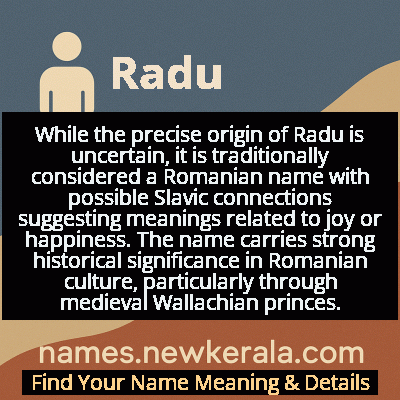Radu Name Meaning & Details
Origin, Popularity, Numerology Analysis & Name Meaning of Radu
Discover the origin, meaning, and cultural significance of the name RADU. Delve into its historical roots and explore the lasting impact it has had on communities and traditions.
Name
Radu
Gender
Male
Origin
Romanian
Lucky Number
8
Meaning of the Name - Radu
While the precise origin of Radu is uncertain, it is traditionally considered a Romanian name with possible Slavic connections suggesting meanings related to joy or happiness. The name carries strong historical significance in Romanian culture, particularly through medieval Wallachian princes.
Radu - Complete Numerology Analysis
Your Numerology Number
Based on Pythagorean Numerology System
Ruling Planet
Saturn
Positive Nature
Ambitious, efficient, realistic, and authoritative.
Negative Traits
Materialistic, stressed, confrontational, and can be overly ambitious.
Lucky Colours
Dark blue, black.
Lucky Days
Saturday.
Lucky Stones
Blue sapphire, amethyst.
Harmony Numbers
2, 4, 6.
Best Suited Professions
Business leaders, managers, financial services, law enforcement.
What People Like About You
Leadership, determination, organizational skills.
Famous People Named Radu
Radu cel Frumos
Wallachian Prince
Ruled Wallachia during the Ottoman conflicts of the 15th century
Radu Vasile
Prime Minister
Led Romania's government during the post-communist transition period
Radu Lupu
Classical Pianist
Internationally acclaimed musician and competition winner
Radu Jude
Film Director
Golden Bear winner at Berlin International Film Festival
Name Variations & International Equivalents
Click on blue names to explore their detailed meanings. Gray names with will be available soon.
Cultural & Historical Significance
In modern Romanian culture, Radu represents a bridge between medieval traditions and contemporary identity. It appears frequently in literature, theater, and film as a character name that evokes both aristocratic heritage and common Romanian values. The name carries connotations of resilience, diplomacy, and the complex negotiation between maintaining cultural identity and adapting to external pressures that has defined Romania's historical experience.
Extended Personality Analysis
Individuals named Radu are often perceived as possessing a balanced combination of traditional values and modern adaptability. They typically demonstrate strong diplomatic skills, emotional intelligence, and the ability to navigate complex social situations with grace. This aligns with the historical Radu cel Frumos, who was known for his political acumen and ability to maintain relationships across conflicting factions.
Radus are frequently described as charismatic yet grounded, with a natural authority that doesn't rely on aggression. They tend to be family-oriented, loyal to their roots while being open to new experiences. Their personality often includes a creative streak, whether expressed through arts, problem-solving, or social innovation. This combination of traditional reliability and contemporary flexibility makes them effective leaders and trusted friends in diverse settings.
Modern Usage & Popularity
Radu remains a popular and respected name in contemporary Romania, consistently ranking among the top 50 male names. While its usage peaked in the 1970s-1980s, it maintains steady popularity due to its strong cultural roots and elegant simplicity. The name has seen some international spread through Romanian diaspora communities in countries like Italy, Spain, and the United States. In recent years, there's been a slight resurgence among educated urban families who appreciate its historical significance without being overtly traditional. The name strikes a balance between being distinctly Romanian while remaining accessible to non-Romanian speakers.
Symbolic & Spiritual Meanings
Symbolically, Radu represents the concept of 'balanced strength' - the ability to maintain integrity while adapting to changing circumstances. It embodies the Romanian spirit of resilience through diplomacy rather than confrontation. The name carries connotations of bridge-building between cultures and eras, reflecting Romania's position at the crossroads of Eastern and Western civilizations. In metaphorical terms, Radu suggests the wisdom of knowing when to stand firm and when to bend, the grace that comes from understanding multiple perspectives, and the quiet confidence that doesn't need to announce itself loudly.

